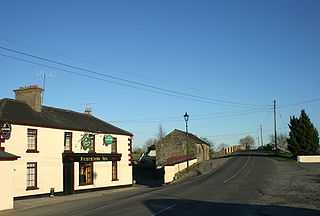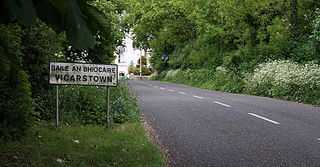Vicarstown
- This article is about the Irish village of Vicarstown. For the fictional town featured in the Rev. W. V. Awdry's railway tales, see Vicarstown (Sodor).

R427 approaching the bridge over the Grand Canal and to the left is the Vicarstown Inn bar.

Entering Vicarstown on the R427
Vicarstown, historically known as Ballynevicar, Ballyvicar and Ballyvicary[1] (Irish: Baile an Bhiocáire, meaning "town of the vicar"), is a village in County Laois, Ireland. It stands at the point where the R427 regional road crosses the Grand Canal of Ireland.The village also has a bar and a place to rent canal barges.
People
- Henry Grattan, the great orator and politician, having been awarded £50,000 by the Irish Parliament in 1782 to purchase lands, bought property in this area from the Cosby family of Stradbally.
- Francis Harrison Biddulph (1774-1827) long time Registrar Of Court of Exchequer in Dublin lived in Vicarstown House probably constructed by his father Francis Biddulph (1727-1806). He married Mary Marsh in 1797 and they had fourteen children. After a protracted dispute he finally got possession of the family ancestral home and estate at Rathrobin, Tullamore in 1824. After his death in 1827 the family appear to have left Vicarstown. Himself and his father were buried in Curaclone graveyard near Vicarstown and in his will he requested a simple headstone with their names and dates upon. Alas the headstone does not appear to have survived.
- William Dunne (1843-1915) Ballymanus House owner/breeder of two Irish Derby Winners Soulouque 1879, King of the Bees 1880 and one Grand National Winner 1867 Cortolvin. His racing colours were black with a pink cap.
- James Crean is the current owner of the former B&B and current bar the, Vicarstown Inn .
Sport
- Annanough (Áth na nEac in Irish) is the local Gaelic football team.
Facilities
- The village has a Catholic church, a large community hall and a Gaelic Athletic Association field.
See also
References
| ||||||||||||||||||||||||||
